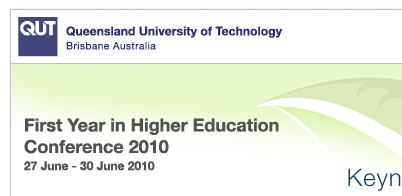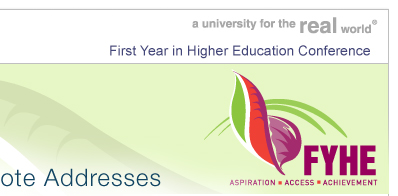 |
| Presenter |
Title |
 Professor Marcia Devlin
Professor of Higher Education, Deakin University
|
Non-traditional university student achievement: Theory, policy and practice in Australia
In addition to the intrinsic commitment that higher education institutions, and the individuals and teams within them, have to the achievement and success of non-traditional students, the links between government widening participation policy, performance measurement and funding to universities will now provide an additional incentive. The future growth of the number and proportion of non-traditional students in Australian universities will focus attention keenly on student achievement. This paper argues that particular theories may be helpful in understanding the experiences and perspectives of non-traditional students and, therefore, in informing policy and practice within institutions and beyond to facilitate student achievement. In particular, notions of the hidden curriculum at university, socio-cultural theory in action, cultural capital, and socio-emotional capability are examined and utilised to inform suggestions for proactive responses in both the ‘public and private lives of higher education’ (Trow, 1975).
Trow, M. (1975). The public and private lives of higher education. Daedalus 2 pp. 113–27.
|
 Professor Marnie Hughes-Warrington Professor Marnie Hughes-Warrington
PVC Teaching & Learning, Monash University |
Which First Year and Whose Transition?: Transforming Academic Teaching Models
This keynote explores the role that teaching models have in supporting aspiration, access and achievement. Drawing on research undertaken in the ALTC project 'Historical Thinking in Historical Education', this paper will tease out how student and staff perceptions of the models of teaching and classroom activities needed for academic success in history have wider pertinence for staff interested in the first year experience.
In particular, it will note how staff privileging of PhD supervision as a model for teaching might be harnessed to develop more effective teaching models for large first-year classes, and in turn, how those experiences might be used to support aspiration, attainment and achievement in higher-degree research programs. In support of these arguments, examples of practice from the 12 participating institutions in the project will be given.
|
 Professor Ruth Pickford
Professor of Assessment, Learning & Teaching,
Leeds Metropolitan University, UK
UK National Teaching Fellow
|
Access to Learning: Designing First-Year Assessment and Feedback
This keynote explores the role that assessment and formative feedback can play in supporting, developing and directing the learning of first year students. The basic premise of the UK National Teaching Fellowship funded First Level Assessment Project (FLAP) is that through engaging with ten principles in our assessment and feedback practice we can positively influence the first year learning experience: providing appropriate social experiences to instil a sense of belonging; empowering students to develop a sense of control over their own learning; supporting learning and development of academic skills; exciting and engaging students in learning and reducing the burden of marking and administration for staff. This fun keynote will consider the ten principles of first level assessment and feedback design and provide practical suggestions for staff to consider in designing their first level assessment and feedback.
|
 Professor Bob Lingard
Professorial Research Fellow, School of Education,
The University of Queensland
|
Teaching First Year University Students: learning from the pedagogical research on schools
This paper will traverse the research on pedagogies that make a difference in schools, particularly with respect to the learning and engagement of students from disadvantaged backgrounds. In particular, the paper will outline, elaborate and discuss the productive pedagogies research derived from a large Queensland government commissioned research project, which I co-directed. ‘Productive pedagogies’ is an empirically and theoretically derived concept, which stresses the multidimensional character of good pedagogies. The four dimensions are: intellectual demand, connectedness, supportiveness and working with and valuing difference. These will be elaborated and translated to the tertiary setting, particularly first year teaching in universities. In this translation, consideration will be given to pedagogical content knowledge and alignment of pedagogies with assessment practices (formative and summative) and university teacher habitus. Time will be given to considerations of the significance of tertiary productive pedagogies in relation to the widening participation agenda and government policy targets around enhancing the numbers of disadvantages students in universities, derived from the Bradley Review of Higher Education. I will argue that such productive pedagogies are necessary at the tertiary level, but not sufficient for enhancing successful university education for all. The pedagogies argument works with Bourdieu’s concept of capitals to argue that effective pedagogies value the capitals students bring, but also work explicitly to make high status capitals available through their explicit scaffolded articulation in pedagogies.
|
|
 |






